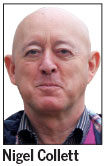Sexual minorities find a friend
Updated: 2013-11-15 06:56
By Nigel Collett(HK Edition)
|
|||||||||
Few current issues affect a minority as small as the lesbian, gay, bisexual and transgender (LGBT) community, which, though they total some 350,000 in Hong Kong - about 5 percent of the population - have no political power and remain largely invisible. Although most older people here take little interest in LGBT matters (only the young see their civil rights as one of the issues of our time), Hong Kong's population has gradually swung behind the idea that their LGBT fellow citizens need protection from discrimination. Yet, every time a motion comes up in the Legislative Council to enable this, government supporters vote it down.
The numbers who turn out on the annual Pride Parade, about 4,500-5,000 last Saturday, are too small, too polite and just too happy to be there to worry anyone. A few, sadly just a very few, big figures in the entertainment industry have come out to support the community. Anthony Wong Yiu-ming and Denise Ho Wan-si are among the few.
So, until the start of this year, prospects for change looked dim. Then along came the new Chairperson of the Equal Opportunities Commission (EOC), York Chow, who moved in his middle years into the administration and rose eventually to be secretary for health, welfare and food. When he was appointed to the EOC, and especially when, shortly afterwards, he gave the press some very balanced words about needing to assess LGBT problems before making pronouncements, the LGBT community feared the worst. Here was yet another Hong Kong placeman, it seemed.
That view was completely misplaced. Chow has, with the backing of his staff at the EOC, taken on the mantle of a champion of LGBT rights. Scarcely a week goes by without a speech in which he makes the case for an ordinance against discrimination on the grounds of sexual orientation or gender identity. More recently, he has added a call for same-sex unions (though not marriage) to be recognized in Hong Kong. He has become the first chairperson of the EOC to be the object of protests by the fundamentalist Christian right. I met Chow to find out why.

What was not known at Chow's appointment was that he had stipulated to the government that he would only take the EOC job if he was given free rein to speak on issues he considered vital to Hong Kong's core principles of equality and fairness but not covered in the EOC's legislated remit. Upon taking office, he took some time to establish priorities and soon discerned that LGBT issues were one. His stance flowed naturally from his medical training. "We do not know yet what causes homosexuality or makes people find themselves at odds within the body in which they live," he told me, "but we do know that there is no evidence that these conditions can change."
But will Hong Kong fight its demons? "I am optimistic," he replies. "Hong Kong is an international city subject to many sorts of foreign influence. The Court of Final Appeal's judgement in the Ms W transgender marriage case has made it clear reform is needed."
Chow believes it is the duty of the EOC to take a firm stand. During the next year, he plans to gather the data that will make the case for change. Most significantly, he now believes that the government should consider legislating to establish some form of legal same-sex unions and recognize foreign ones.
The EOC can only influence the government and try to educate the public. It has no statutory power in these areas. Yet, led by its new chairperson, it has invigorated the debate, clarified issues, and given heart to the LGBT community.
The author is Hong Kong correspondent for fridae.asia, Asia's largest LGBT news and social networking website. In 2008 he was appointed English secretary of the Pink Alliance, Hong Kong's largest grouping of LGBT organizations and he remains prominent in LGBT activism in that post.
(HK Edition 11/15/2013 page9)